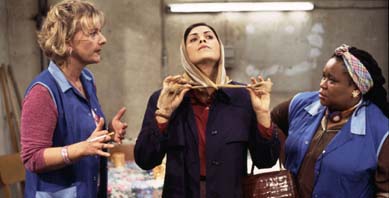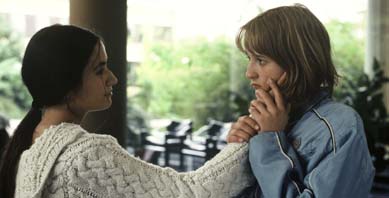Daughters of Two Worlds? Women Characters, Films by Women
A favorite subject of German immigrant film in the 1970s and 1980s was the fate of the Turkish woman; twice alienated, once as a woman and again as a foreigner, she had no language, no rights, and no way out. Enormous changes have taken place since then in the lives of second- and third-generation Turkish-German women. A generation of self-confident women directors now stands behind the camera. "German viewers still expect socially critical films, but I'm interested in making stories for the heart and soul," states Buket Alakus, whose film "Anam" ("My Mother") came out in 2001. She intended the film "to entertain but sometimes, too, to go against convention. [...] Anam ultimately isn't a Turkish woman, at least not in the way Turkish women are portrayed in the movies she's seen."

In the documentary "Töchter zweier Welten" (1990), Serap Berrakkarasu depicts the problems of arranged marriages and marital violence, but without glorifying victimhood. The film centers around a dialogue between two generations of women who must find their own way between two cultures. In "Mädchen am Ball" (1995) and "Nach dem Spiel" (1997), Aysun Bademsoy portrays five Turkish-German football players. The focus of her thirty-minute documentary "Ein Mädchen im Ring" (1996) is the boxer Fikriye Selen, who trains along with forty men at the "Faustkampf" Boxing Club in Köln. In "Wie Zucker im Tee" ("Like Sugar for Tea", 2001), Hatice Ayten shows people who "with their winning, open smiles put paid to the old story about fractured identities." With "Auslandstournee" ("Tour Abroad", 2000) Ayse Polat has succeeded in treating radical cultural changes and sexual boundaries with a sense of humor. In this road movie, a gay torch singer travels with an eleven-year-old girl from Turkey to Germany on the trail of her vanished mother. Polat's second feature, "En Garde" (2004), tells of the friendship of two unusual girls: the Kurdish asylum-seeker Berivan, and the lower class German Alice. "En Garde" was distinguished with a Silver Leopard at the Locarno International Film Festival.

The actress Idil Üner is likewise no stranger to the director's chair. Her directorial debut, the comedy "Die Liebenden vom Hotel Osman", won the 2001 German Short Film Award (Gold Medal). The young director Canan Yilmaz provides a refreshing cinematic treatment of transnationality with her questioning film: "Ben Kimim?/Wer bin ich?" (2003). The four-minute short shows a young woman in a black sweater and dreadlocks, turning around inside a room. When she's facing the viewer, she ask herself (and her public) in German and Turkish, "Ben kimim? Wer bin ich? - Who am I?" And answers at once: "I'm a German! A Turk! A Turkish-German citizen. A Turkish German, a Turkish woman born in Germany, a German woman of Turkish origin, a half-German woman. German. Turkish. Turkish-German?" At the end of the film she recites, with ironic pathos, a poem in Turkish: "The day will come when you'll know what you are. My heart is bleeding, my heart is on fire. What am I? Where am I from, and where am I going? Who am I?" The young woman, now wearing a head scarf and clad in blue silk from head to toe, turns around inside the room. The director/actress's body is both an authentification of her identity, which resists stereotyping, and a playing field. "Ben Kimim" is both a game with the camera and a game with self-image and the image of the other: the director's self-image and images of other, as well as those had by her viewers, who in viewing have become part of the game.